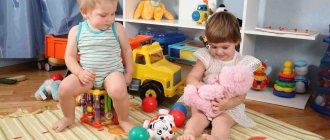Forming a child’s personality is the first step in preparing him for adulthood. This is an important task for parents and society, and it is not limited to just teaching certain skills. To raise a mature personality, it is necessary not only to tell him about discipline, self-care and the like, but also to instill moral and ethical standards and spiritual values.
What is personality formation
Personality formation is a complex process that is not interrupted at any stage of human life. Simply put, it is infinite. The very concept of “personality” is very multifaceted, and there are two popular professional views on this phenomenon. One of them says that the formation of a child’s personality depends on natural innate data. The second opinion indicates that personality is a social phenomenon, and only society influences its formation.
In fact, the entire period of a person’s life, from birth to adulthood, is a process of personal growth or degradation. It is believed that development occurs in activities that are significant to the individual. The driving force can be called internal contradictions between the needs of a growing child and the real possibility of their implementation. The child’s activities are almost always determined by the parents and, to one degree or another, directed by them. Conclusion: the process of upbringing is the leading factor in the formation of a child’s personality.
Phases of personality development
There are three phases in the formation of a child’s personality
Adaptation
Lasts from birth until adolescence. The individual assimilates social experience - he adapts, imitates, adapts. During adaptation, there is an active adoption of social norms and mastery of various forms of activity. Having shown his own individuality in the group, the child cannot express himself as an individual until he masters the norms existing in the group.
He feels the need to be like others, adapting as much as possible in society. We can talk about a kindergarten or school.
Group activities can provoke the emergence of favorable conditions for the formation of the child’s personality and those traits that were not previously inherent in the individual, but which are characteristic of other members of the group.
Personalization
The child has a desire to oppose himself to others, to stand out. A critical attitude towards the norms of society and established social rules is formed. The impetus for individualization is the contradiction between the result of adaptation and the need for personalization that was not satisfied at the initial stage. The search begins for methods that help in gaining individuality and fixing it. This can manifest itself in behavior, clothing, speech, and so on. If, during the formation of a child’s personality, he has successfully coped with adaptation, then gradually he begins to understand that individuality is being lost. The individual mobilizes internal resources and begins to search for a society capable of providing the necessary personalization.
Integration
The child has a desire to find his place in society, to fit into society. Integration is easy if society accepts the person. Other results are also possible. A person tries in every possible way to preserve his difference, which leads to aggressive interaction with society and people. Integration is characterized by contradictions between the subject’s desire to demonstrate his own individuality and the community’s desire to cultivate and approve only those individual qualities of the subject that correspond to its preferences.
Team
This is the main base, with the exception of the family, where children receive their first social experience. It is in the team that the child begins his development as an individual. In addition, in school, communication is planned and subsequently directed by highly qualified teachers.
A team is an association of students characterized by certain characteristics. The main one is that they have a common socially significant goal - obtaining an education.
Another principle involves the joint activities of the team. And a relationship of responsible dependence. Everyone knows that a specific connection is formed between members of any team, which reflects both the unity of their activities and experiences with value judgments.
The last sign of a team is the presence of a common governing body. In this case, naturally, it is the teacher who regulates all psychological and pedagogical processes. It is the teacher who creates a healthy microclimate in the team, promotes friendly relationships between students, and helps them be united. And it depends on the teacher whether the children understand what mutual understanding and mutual assistance are.
What factors influence the development of a child’s personality?
Many factors influence the formation of a child's personality. From a number of theories put forward by various psychologists, the main idea should be highlighted: personality development occurs on the basis of natural data, self-awareness and life experience. Formation begins at an early age.
Internal factors influencing: temperament, inherent at the genetic level. External factors: upbringing, social level, environment, and even the current era.
Many experts believe that genes have a significant influence on personality, containing information about the ancestors of the mother and father. A newborn person continues two genera at once. This does not mean that he will receive their character traits or talents. Nature will provide him with a basis for development, and all he has to do is use it.
The significance of the biological factor is high. This explains how people who grow up under the same conditions become unique and exhibit opposite qualities. Biological factors are the basis for the formation of a child’s personality. Socialization plays an equally significant role. Development occurs in stages. The perception of the world is influenced by the upbringing received by a person and the example of his parents.
The problem of modernity
In pedagogy, formation is the process of personality formation. And it is usually considered as a problem of education. And in the modern 21st century it is really acute.
This is because now many people have a tendency to advocate the free development of personality. Some even seriously consider pedagogical education to be a violation of the pupil/student’s right to be an individual. Therefore, a professional teacher must competently combine traditional methods with modern ones.
Self-determination is important. But! No less important is the integration of the student into world and national culture, the formation of him as a citizen, as well as instilling in him the awareness that without cooperation and mutual understanding it is impossible to exist in modern society. Foreign concepts are interesting, but they cannot be transferred unchanged and, especially, completely into our lives. This is what parents of the 21st century must understand first.
Education and personality formation in the family: the importance of parents
Psychologists are convinced that parents have a decisive influence on a child’s personality, his perception of the world, feelings and aspirations. The relationship between father and mother, as well as between other relatives, is important to him. The attitude of the family directly towards the child plays a huge role.
The surrounding social environment also influences the formation of personality. Education is a purposeful process of influencing a person, and it is precisely this that is at the basis of the cultivation of personality.
Many people ask the question: “What plays a decisive role in personal development and consciousness - natural forces, social environment?” It is impossible to single out anything separately, but it is obvious that the first years of human life are fundamental. Children growing up in a family largely adopt their parents’ behavior, attitudes, and values. Subsequently, the personality may acquire additional minor touches, but it is in childhood that the foundation is laid. If the father and mother pay little attention to the baby, then he receives “material” for development from other available sources, which are not always beneficial. Parents should remember this and take care of daily quality interaction with their child. At an early age, reading fairy tales helps a lot, as it instills in the child an understanding of good and evil. Be sure to analyze what you read and think through other options for developing the story.
Psychological aspect
As mentioned earlier, the concept of personality formation in pedagogy is directly related to psychology. This means that the methods used in this educational process are also of an appropriate nature.
Many teachers often ask their students to solve Lawrence Kohlberg's dilemmas. This man is one of the founders of moral theory. He insisted that nothing in the world is absolutely right or wrong. The morality of any action depends not on its consequences, but on the person’s intentions. And he was right.
Kohlberg's dilemmas are hypothetical situations. However, in real life there are tens of thousands of identical ones. There is no perfect solution, each has its pros and cons. Here is one of these dilemmas: one woman has a severe, incurable form of cancer. She has six months to live, but she is constantly in severe pain. The woman asks her doctor to give her an increased dose of morphine, allowing her to “go away.” This is illegal, but the doctor understands the patient’s request and is considering fulfilling it.
This dilemma is very useful in forming beliefs. It provokes thought, evokes emotions, makes students think, and puts them in the place of participants in the situation. They, in turn, ask themselves a lot of questions that would help them find a solution and understand whether it is correct. This is how children learn to empathize, sympathize, reflect and feel responsibility.
What mistakes do parents make when raising individuals?
When shaping a child’s personality, it is important for parents to avoid such common mistakes.
Categorical prohibition
The main mistake of education. Be patient with your baby and respect him. Without learning to understand it, parents make inevitable mistakes that lead to mental and physical problems. By ignoring the desires and interests of the child, responding to most of them with categorical prohibitions, you can even skip the initial stage of some disease. Example: you notice that the child has started eating lime. The first reaction of most parents: dissatisfaction, screaming, a ban on approaching the wall. Correct reaction: visit the doctor. The doctor will probably tell you that there is a lack of calcium salts in the baby’s body. In addition, such an attitude will create in the child a desire to perform certain actions on the sly. Many become secretive and distrustful.
Overprotection
When shaping a child’s personality, overprotection is not the best helper. Excessive care can have a negative effect on the baby. When he reaches a certain age and tries to show independence, this is often met with hostility. Example: a child wants to use a spoon himself, but the mother, fearing that he will get dirty or not be able to cope, continues to feed him herself.
Overprotection manifests itself in violent action, which can result in the emergence of neurosis. In other cases, guardianship unless absolutely necessary can result in the child never being able to make friends, because the mother and grandmother are always nearby. The individual may have difficulties with socialization; he does not acquire the ability to express and defend his opinion. Possible consequences: psychological problems that can only be eliminated with the assistance of specialists.
Excessive demands
For the full development of a child’s personality, it is necessary that he not only knows, but also understands what is allowed and what is prohibited. If you show excessive demands on him, without giving clear explanations of the reasons why you need to do as you say, then this will not lead to good. What traits will the personality acquire? Irritability, stubbornness. The best option: parents explain in detail the reasons for their demands, and over time they become the child’s personal beliefs.
Notations
The first factor provoking children's protest is lengthy lectures. Parents often believe that their child will learn information better by listening to long and repetitive lectures. There is no need for them. This approach has no constructive component. Particularly taboo is other children being held up as examples. Gradually, the child will begin to perceive them as personal enemies. Boring notations often cause a negative reaction, losing their educational value.
Immense pampering of a child
Parents who spoil their children too much create a big problem. This phenomenon is no less negative than lack of influence. Spoiled children, who do not know anything to be denied, who have no responsibilities, eventually face the impossibility of overcoming even minor life obstacles and problems. When a situation arises when their desires and reality do not coincide, they lead to overstrain of the nervous system, which can result in a breakdown.
What conditions will ensure successful personality formation?
Important conditions for the formation of a child’s personality.
Example of parents
It is important for a child to see that mom and dad do not follow a certain script, but really live a happy and fulfilling life. It is impossible to make another person happy if you yourself are unhappy. Many psychologists note that people who do not experience inner harmony often complain about problems in relationships with children. Only happy parents will be able to truly understand their child by building a trusting relationship with him. This contributes to the successful formation of personality. When trying to help your child with this, start with yourself. Reflect: do you know how to accept your feelings, do you allow yourself to truly be happy and sad. Or maybe you are restraining yourself and teaching your child excessive restraint, thereby suppressing his personality.
Communication with others
Show by example how to communicate with other people. Give yourself a little test by honestly answering the question: “Are you able to have an unbiased conversation with a person with whom you disagree in some aspects?” Is there a possibility that you are trying to impose an opinion on another person or are you submitting to someone else’s will? The child will probably adopt this feature from you.
Don’t impose your opinion and position – just share your values. Have you heard the definition of “heartfelt conversation”? Such dialogues arise when a person is ready to understand the interlocutor and share his opinion. In relationships, a person develops, allow yourself to learn new things and teach this to your child.
Care and attention
A person who has felt care and attention at the dawn of development will certainly feel confident and protected. Mother and father become important life references, exerting serious influence. It is great if a mother can demonstrate such qualities as forgiveness, acceptance, love. The child needs to feel affection and warmth. In a father, strictness and gentleness are important, acting undividedly.
Parents are the most important stage in the formation of personality. Everyone knows the words that raising children should begin with their own upbringing. Start with yourself if you want to help your child’s personality acquire important facets.
Socialization
This is exactly what happens in a team. Formation is a definition in pedagogy, the meaning of which has been given a lot of attention. What can you say about creating a student team? This process is extremely important because it is in this society that children will grow as individuals and learn.
In a good team, the ethical education program is implemented in full. Children form opinions about the norms of interpersonal relationships, they learn forms of expressing requests, greetings and addresses, learn correct behavior and competent speech. In the future, they develop the ability to interact with other people. They adapt to them, try out the acquired communication skills and qualities. Children also begin to sympathize and empathize with people, animals, plants, and often even try to look for ways to cooperate with their parents.











